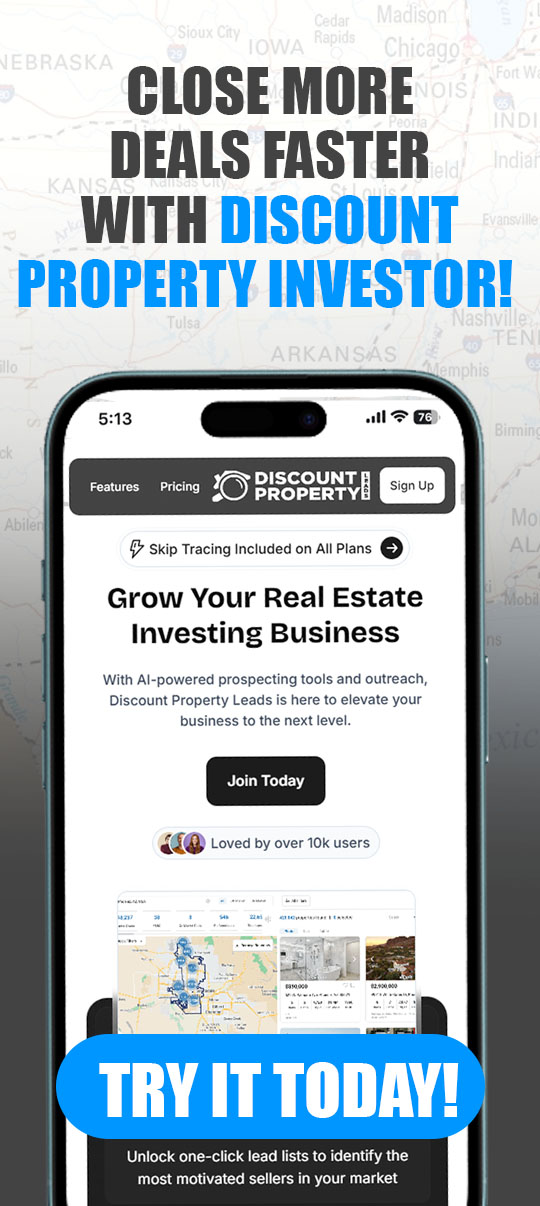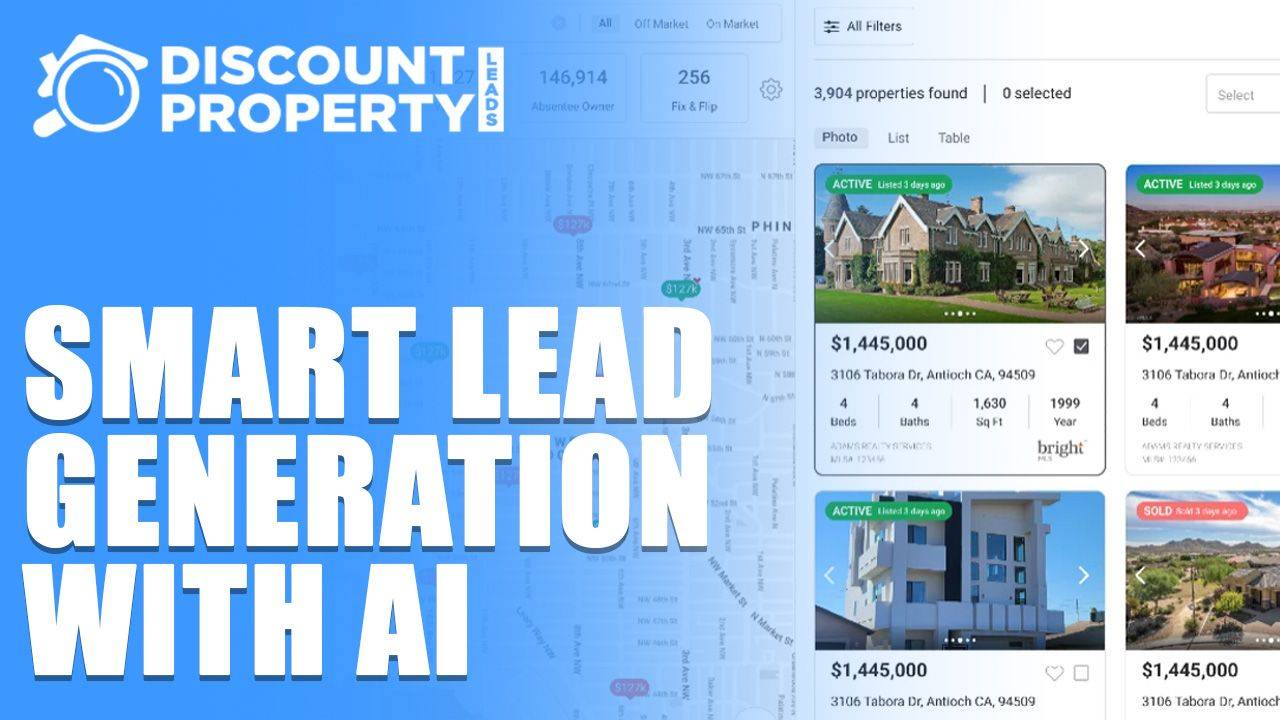Episode 105: Repeat
Sep 22, 2022Show Notes
Repeat. Repeat. Repeat. The last step in BRRRR investing is REPEAT! This is SO powerful! You can refinance your property and get most of your money back and then start the whole process over again, thus Building wealth for yourself. Listen in to the Last episode of the BRRRR series by Mike and Dave.
Episode Transcripts
David: Alright guys, welcome back to the Discount Property Investor podcast. This is your host David Dodge, joining by co-host--.
Mike: Mike Slane. Thanks for joining us guys, we are excited to chat with you again today. Dave and I always encourage people, you have probably heard a thousand times by now if you listen to our podcast, check out the free wholesale course, freewholesalecourse.com. Wholesaling is the way we think you should start your real estate investing career, because it is the lowest risk, and probably the highest reward for most people getting started. If you don't know anything about real estate investing; it's a great way to learn everything, kind of the school of hard knocks, lot's of highs, lot's of lows, and some big pay days if you're successful. So very cool way to start, check out the freewholesalecourse.com. Today we are going to continue our little mini series, our web series on the BRRRR strategy.
David: Got to love the BRRRR strategy!
Mike: Rocking and rolling through the BRRRR strategy in our business. Dave, give us a quick summary; what is the BRRRR strategy?
David: BRRRR! Got to love the BRRRR strategy, guys! The BRRRR strategy is-- it's an acronym, it stands for Buy, Renovate or Rehab, and the next R would be to Rent, then next R would be to Refinance, and the last R would be repeat. Basically it's an acronym that lays out a strategy by rehab, rent, refi, repeat. This strategy will allow you to use little to none of your own money-- you use private investor's money, or hard money lenders to purchase properties, to get these properties set up as assets that cash flow and pay you money every month, then you get a bank loan to refinance you out of that loan with your hard money or your private money lender, then you now have a loan with a bank for a long period of time at a low interest rate. So again, the BRRRR strategy is an acronym that lays out a strategy, that allows your to purchase assets with little to none of your money, then also to purchase lots of assets in a quick way, and a quick manner. So the BRRRR strategy is an awesome strategy, we use it currently. Right now we are almost to 50 properties, and our goal is to get to 150 properties. So we have a 100 to go, guys. That is a big goal, but we are not scared, we are ready to jump in, we are ready to buy the next 100, and if we can get there in one to two years, I think we will be doing pretty good and we are happy with that goal. So the BRRRR strategy in some of the previous episodes, we talked about each individual thing. We did an episode on buying those properties and what you should look for, how you should be buying those, using somebody else's money with-- a hard money lender, or a private lender, or even IRA or something along those lines. We covered all that in episode one, talking about buy. In episode two we jump into rehabbing that property; how you should be rehabbing it. Now again, these properties are going to be tenant properties, they are going to be rental properties. So there is some tips and tricks that go into rehabbing these properties, you don't want to overdo them. You want to use materials that will stand the test of time. Materials that won't be outdated in two to three years, as well as durable materials that can withstand several tenants for several years, to save you the cost of having to do this every couple of years. Lot's of tips and tricks in that episode on the buy-- actually that's episode two. In episode three we talk about the rehabbing. Then again, episode-- four is the rental process. So we personally have a property manager. But, we talk a little bit in that chapter about doing it yourself, learn the business, learn the game, learn dealing with tenants, learn about the leasing process, right? Once you scale, you can hire a property manager, you can hire one from day one if you like, but we recommend you getting your feet a little wet, you know? Learning some of these processes. So that would be the process of renting it out. Last chapter we did an introduction to refinance, talking about how you refinance. You use a local bank, typically a commercial loan that has a term of three to five years, and you can pick your amortization. If you have a lot amortization of 25-30 years, you are going to make more cash flow on that property. However, you are going to have a longer term, you are going to have to be paying those payments longer. If you chose to do a 15-20 year amortization, you are going to have reduced cash flow because your monthly payment is going to be a little higher. But on the flip side however, you have a monthly payment that's higher, however-- you-- are going to pay that loan off quicker. There are pros and cons to it both ways, but either way, the way I look at it; I don't care if I have a loan for five years or if I have a loan for 30 years, I am not the one paying that loan off, the tenant is. So all I have to do is manage the tenant or the property management company, and somebody else is paying off debt for me. This is what I like to call good debt, okay? I am buying assets with good debt, someone else is paying that off. Then again of course each of these assets spits of what we like to call as cash flow, which really just means the net profit. Cash flow is equivalent to net profit. What do you have left after you collect the rent, and you pay all the bills? So all those bills would include the mortgage, which may or may not be escrowed with taxes and insurance. If it's not escrowed, then you need to make those payments every month. So a mortgage, taxes and interest. You may have some utilities that you require or the the city and county level requires you keep in your name, like trash service or sewer service. You may be able to get those tenants to pay those bills, or you can bill them back, but again you may have to keep those in your name, those would be expenses that come off. If you have a property manager you are going to have to pay them a monthly fee to manager your property. Then you may have capital expenses or vacancies that you need to factor in there too. So the cash flow again is nothing more than what is left over.
So let's just do a quick scenario. I have a rental property that rents out for a thousand, the mortgage is 600, and all the other bills combines are 150, that's 750 total in bills. Every month I bring in a thousand. That means I have cash flow of $250 that I get to put in my pocket.
So let's talk a little bit about why these are assets. First and foremost, if you don't know; now you know. Assets are-- has the most simple definition, okay? An asset is something that puts money in your pocket every month, period. If you don't know the definition of an asset, now you do, okay? Your car is not an asset. Unfortunately your home is also not an asset. It may be a great tool for saving money or building equity and so on and so forth, but it is not an asset. The reason is, is because assets put money in your pocket every month. If it is not an asset then everything else defaults to liability, okay? It is either taking money out of you pocket every month, or it's a place that the money is sitting, most likely depreciating, okay? Again, we like to buy assets, we use the BRRRR strategy to buy assets with little of our own money, often times none of it, most often times none of it. Again, we are acquiring an asset that spits off cash flow that we get to deposit in our bank every single month. Then of course we are paying the mortgage with the tenants rent. Somebody else is paying off this loan.
Now one thing I didn't really mention yet about some of the other advantages of real estate are the tax advantages. You get to depreciate a property, all these expenses are tax write offs. Real estate is actually one of the best tax write offers, or shelters, or ways to defer or even eliminate taxes completely. Real estate is the easiest way to do that. Again, there are lot's of advantages to using a strategy like this to acquire a lot of assets in a short period of time.
Mike: I love it, man.
David: Pretty much nailed that one.
Mike: You did, you nailed it right out of the park. We love real estate. Chapter one we really emphasized the fact there are so many advantages to real estate including the tax benefits. It is one of the proven ways that people have created wealth for themselves more than any other. I don't have the stats in front of me, but I know it's one of those that-- 9 out of 10 millionaires are real estate, real estate is how they did it. It's-- the game changer, man. We are on our way. Again, once you get that million, you worry about protecting it, you know? Build some wealth then protect that wealth. Alright guys, I think that's pretty much--.
David: That kind of sums it up, guys. Again, we want to keep this strategy simple, alright? It is simple. Now one thing we have said in previous episodes, as well as in our book, 'The ultimate guide to wholesaling real estate', start there if you haven't purchased the book. Keep it simple. This business isn't always easy, but if you look at the big picture it is very simple. So the harder you work the easier it gets. This is not going to come easy I promise you that. But if you put in the time, and you are committed, and you stay persistent, it will get easier, alright? But at the end of the day it is very simple, so I am going to do one more recap about BRRRR, guys. It's an acronym and it is a strategy that lays out how to acquire a lot of assets in a short period of time with little to no money. What is the strategy? BRRRR, it stands for Buy, Rehab or Renovate, Rent out, Refinance, Repeat. If you can do that, learn the strategy and start doing it yourself, you too can acquire 150 properties in a few short years, love it. Anything you want to add to finish this off, Mike?
Mike: You nailed it, thanks for listening to the Discount Property Investor podcast, guys. Check out the freewholesalecourse.com.
David: Thanks guys, talk to you soon.







